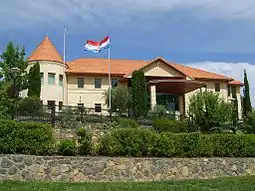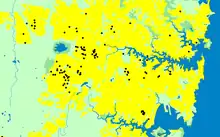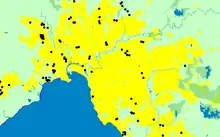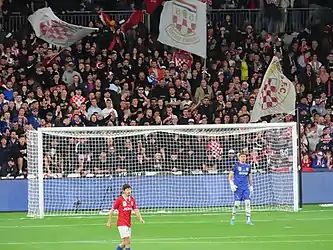| Total population | |
|---|---|
| 164,362 (Croatian ancestry in 2021) 43,302 (Croatian-born in 2021) | |
| Regions with significant populations | |
| Melbourne, Sydney, Canberra | |
| Languages | |
| Australian English, Croatian | |
| Religion | |
| predominantly Roman Catholic, Protestant with some Greek Catholic | |
| Related ethnic groups | |
| Croatian Americans |
| Part of a series on |
| Croats |
|---|
 |
Croatian Australians are Australian citizens of Croatian ancestry. Croatia has been a source of migrants to Australia, particularly in the 1960s and 1970s. In 2021, around 200,000 people resident in Australia (0.6%) identified themselves as being born in Croatia or having Croatian ancestry.
History
Prior to World War II
Croats were first encouraged to migrate to Australia during the gold rushes of the 1850s taking place in the British colonies of Victoria and New South Wales. Although migration was relatively small, Croatian travellers and sailors employed on merchant vessels played a significant role in spreading the news of the opportunities possible in Australia.[1]
In an interesting occurrence in October 1875, sixteen Croatian sailors aboard the vessel Stefano, became shipwrecked on the Ningaloo Reef along the West Australian coast. Ten survived to reach the shore where the local Yinikutira people gave them food and water, and found their map of the coast amongst the shipwreck's debris. By January 1876, all but two had died from hunger or exposure. The two survivors, Baccich (aged 16) and Jurich (aged 19), became part of a Yinikutira clan and spent the following three months living with them around the North West Cape. They were rescued by a pearler looking for Aboriginal labour in April 1876 and, after a few months in Fremantle, they returned to Europe.[2][1]
The Western Australian gold rushes in the 1890s started a significant migration of Croats (mainly from Dalmatia) to Australia and by the early part of the 20th century, there were around 2000 to 3000 people of Croatian origin in Australia, 80% of these residing in Western Australia. Around 100 Australian Croats fought for the Allies during World War I. However, during this war around 600 non-naturalised Croats were interned at the Holsworthy Internment Camp where 20 died and about 500 were later deported from Australia in 1919.[1]
During World War II, the fascist dictators Benito Mussolini and Adolf Hitler established the Nazi puppet-state of the Independent State of Croatia. Croatian Australian representatives during this time deplored this development as a tragedy for the Croatian people and condemned the quisling Ante Pavelić as a traitor.[3]
Tom Starcevich, a Croatian Australian born in Subiaco, Western Australia was a recipient of the Victoria Cross medal for bravery during World War II.[1]
Post World War II
Croatian migration to Australia took on a different aspect after World War II. From 1945 to 1952, Australia's post-war immigration scheme saw around 170,000 Eastern European displaced persons, including Croatians, given residency. Some of these Croatian migrants were associated with the defeated Ustaše regime. In the context of the White Australia policy, Cold War anti-communism, and the shortage of workers at the time, the Ustaše in Australia were allowed to dominate and influence the Croatian migrant community through the establishment cultural and sporting clubs around Australia that promoted Ustaše ideals. This influence continues into 21st century Croatian-Australian society.[4][5][6][7]
During the 1960s and early 1970s, the Ustaše splinter groups in Australia led by people like Srećko Rover ran a campaign of bombings, intimidation and insurgency operations against pro-Yugoslav interests. Eventually, after a large bombing in Sydney injured many people, a crackdown on the Ustaše movement in the Croatian-Australia community occurred from late 1972. This was spearheaded by the Attorney-General, Lionel Murphy, who raided ASIO Headquarters and made public the files on the Croatian terrorist activities.[8][9][10][11]

In November 1977, an unofficial Croatian embassy was opened in Canberra, causing a legal and diplomatic difficulty for both the Australian and Yugoslav governments.[12] The embassy, aimed at raising awareness of Croatia as a nation and the Croatian people separate from Yugoslavia, remained open for 2 years closing in 1979. Its ambassador was Mario Despoja, the father of former Democrats leader Natasha Stott Despoja.
Since the independence of Croatia in the 1990s, an official embassy has been opened in Canberra and consulates have been opened in Melbourne, Sydney and Perth.
The Yugoslavia-born population reached 129,616 by the 1971 Census and 160,479 by the 1991 Census. The greatest number settled in Sydney and Melbourne, though Croats are well represented in every Australian city and region. Croatian migration to Australia has been very low since the 1980s.
Demographics



The 2021 Census data released by the Australian Bureau of Statistics showed that 43,302 persons resident in Australia identified themselves as having been born in Croatia, representing about 0.15% of the Australian population. The Census also noted 164,362 persons identified themselves as having Croatian ancestry, either alone or in combination with another ancestry, representing a further 0.65% of the Australian population. Most of this demographic were shown to reside in Victoria and New South Wales.[13][14]
As the level of immigration from Croatia has dropped significantly from the 1980s, the Croatian-born population is ageing: 57% of the Croatian-born population was aged 65 years or older at the time of the 2021 Census. The 2021 data also revealed that 15% of Croatian born Australians spoke only Croatian at home, while 24% spoke only English at home, and 72% of Croatian born Australians recorded their religion as Catholic.[13]
Croatian Australians historically have an exceptionally low rate of return migration to Croatia. In December 2001, the Department of Foreign Affairs estimated that there were 1,000 Australian citizens resident in Croatia, mainly in Zagreb.[15]
Croatian Australians and soccer

Croats in Australia and their Croatian Australian offspring are notable for their commitment to soccer, with numerous clubs established throughout the country,[16] the most notable and successful being Sydney Croatia and Melbourne Croatia. These clubs nurtured the soccer talents of a large number of Croatian Australians, many of whom now play professionally overseas. Croatian Australians have played for both Croatia and Australia. In the 2006 World Cup, there were seven Croatian Australians playing for Australia and three playing for Croatia. A total of 47 Croatian Australians have gone on to play for the Australian national soccer team, including 7 who captained the national team. The Australian-Croatian Soccer Tournament is the oldest running soccer competition in Australia.
Croatian Australian Socceroos
- Zlatko Arambasic
- Mark Babic
- Zeljko Babic
- Yakka Banovic
- Paul Bilokapic
- Mark Bosnich
- Mark Bresciano[17]
- Branko Buljevic
- Ante Covic
- Jason Culina (C)
- Ivan Franjic
- Eugene Galekovic
- Steve Horvat (C)
- Mile Jedinak (C)
- Ante Juric
- Frank Juric
- Tomi Juric
- Matthew Jurman
- Zeljko Kalac (C)
- Fran Karačić
- Steve Kokoska
- Eddie Krncevic (C)
- Tony Krlsovic
- Andrew Marth
- Frank Micic
- Ljubo Milicevic
- Ante Milicic
- Branko Milosevic
- Ante Moric
- Jason Petkovic
- Michael Petkovic
- Tom Pondeljak
- Tony Popovic
- Ivo Prskalo
- Wally Savor
- Josip Skoko (C)
- Matthew Spiranovic
- Mark Talajic
- Dario Vidosic
- Mark Viduka (C)
- Billy Vojtek
- Robert Zabica
- Ruben Zadkovich
- David Zdrilic
- Ned Zelic
Croatian Australian Matildas
Croatian Australians in Croatian national team
Culture
- Croatian Folkloric Arts Festival in Adelaide[18]
- Croats in Australia from the Sali on Dugi Otok island organised themselves into ”Sons of Sali” (S.O.S.) and ”Sisters of Sali”. They organise the Annual Sons of Sali Picnic and Bocce competition, as well as SOS Karte nights.[19]
- Croatian Herald, newspaper in Victoria[20]
- Croatian Studies Centre (CSC) within the School of Modern Languages at Sydney’s Macquarie University, established in 1994.[21]
Language
- The Association of Croatian Language Teachers in Victoria, established in the 1970s, helped in developing Croatian language programs for primary and secondary schools in Victoria.
- Australian Croatian Community Services (ACCS), based in Footscray, provides Croatian language courses[22]
- Croatian Language Center, teaching Croatian as a foreign language[23]
List of notable Croatian Australians
Entertainment and the arts
- Steve Abbott - comedian, The Sandman, Russian/Croatian mother
- Eric Bana – actor (Croatian father)
- Charles Billich – artist
- Nathaniel Buzolic – actor
- Drago Marin Cherina - sculptor
- Branka Čubrilo – novelist – Croatian born, migrated to Australia 1992.
- Ante Dabro – sculptor
- Natalie Franceska (nee Blažević) - children's author
- Silvana Gardner - poet and visual artist
- Robert Jozinović – actor
- Melita Jurisic - actress
- Robert Luketić – film director
- Tatjana Lukić – poetry editor and poet
- Ivan Sen – film director - Croatian father, Aboriginal mother
- Marisa Siketa – actress
- Mark Strizic - Photographer and painter.
- Frances Vidakovic - author and blogger.
- Emma Viskic - author - Croatian father, Irish Australian mother.
Music
- Alison Wonderland – electronic dance music producer, DJ and singer.
- Russell Baricevic - bass guitar - Bored, Pray TV, The Gas Babies, Macho Clowns, Unclean Spirits
- Peter "Blackie" Black – (Croatian mother) – musician, founding member of The Hard-Ons.
- Philip Bračanin – composer and musicologist.
- Josipa [Knežević] Draisma - comedian, singer, actor, writer and theatre maker.
- Mikelangelo (Michael Simic) aka The Balkan Elvis - singer (solo, Johnny Presley and the Zagreb Allstars, Mikelangelo and the Tin Star). Father is Croatian from Tučepi, Croatia.
- Steve Pavlovic – music entrepreneur[24]
- Roddy Radalj – musician, founding member of the Hoodoo Gurus, the Dubrovniks and Roddy Ray'Da & the Surfin' Caesars.
- Rex Radonich (1950-1986) - Banjo player in Australian Bluegrass band Bullamakanka. Was regarded as the best at picker at the time. Grandson of Mate Radonic (born Podgora Croatia) of New Zealand.
- Natalie D-Napoleon - (Croatian father and mother) - Australian singer-songwriter and poet.
- Tony Slavich - keyboardist - Ariel, Sun, Mike Rudd and the Heaters, Mondo Rock, Goldrush, Ross Ryan band, Richard Clapton Band.
- Adalita, born Adalita Srsen, solo performer and member of Magic Dirt. Her father is Croatian.
- Boris Sujdovic – (Croatian mother) – musician, founding member of The Scientists, the Dubrovniks, Beasts of Bourbon.
- Simone Young - (Croatian mother) - Australian conductor
- Samantha Tutić, stage name: Samsaruh – musician, born and raised to Croatian parents in Melbourne, sung and recorded in Croatian[25]
Academia
- David Andrich – academic
- Luka Budak – author, Head of Croatian Studies, Macquarie University.
- Val Colic-Peisker – associate professor, sociologist and author.
- Vesna Drapac – Associate Professor of History at University of Adelaide, author ("Constructing Yugoslavia: A Transnational History" 2010).
- Roman Krznaric – social philosopher, author ("The Wonderbox: Curious histories of how to live" 2011, "How to Find Fulfilling Work (The School of Life)" 2013 , "How Should We Live?: Great Ideas from the Past for Everyday Life" 2015, "Empathy: Why It Matters, and How to Get It" 2015, "The First Beautiful Game: Stories of Obsession in Real Tennis" 2015, "Carpe Diem: Seizing the Day in a Distracted World" 2017) and founder of the Empathy Museum.
- Ralph Pervan (1938–1980) – academic and author ("Tito and the students : the university and the university in self-managing Yugoslavia" 1978), namesake of the "Ralph Pervan scholarship", University Hall, Western Australia.
Science and medicine
- Tony Bacic - biologist
- Brice Bosnich - chemist
- Stjepan Marcelja - physicist
- Boris Martinac - biophysicist
- Ivan Marusic - physicist
- Vlado Perkovic – physician
- Zed Rengel - environmental scientist
- Ralph Sarich – Inventor of the revolutionary Orbital Engine, and at one stage, in the 1970s, Australia's richest person.
- Frances Separovic- biophysical chemist
- Hrvoje Tkalčić - geophysicist
Business and work
- Jim Bosnjak – former owner of Westbus, the biggest bus company in Australia
- Katarina Carroll (nee Bošnjak) – first female Police Commissioner, for the State of Queensland. Her parents are from Ljubuški, Bosnia and Herzegovina
- Juli Grbac, fashion designer who was the first winner of Project Runway Australia.
- Tony Šantić – Millionaire tuna fisherman, horse breeder and owner of Makybe Diva
- Tony and Ron Perich – brothers, property development, on Forbes Australia's 20 Richest people 2019.
- Zeljko Ranogajec – businessman and professional gambler.
- John Setka - Australian Trade Union leader
Media
- Charmaine Dragun – journalist
- Laura Dundovic – Top 10 finalist of Miss Universe 2008
- Tom Dusevic – journalist, author ("Whole Wild World", 2016)
- friendlyjordies - Jordan Shanks-Markovina; independent journalist, YouTuber, stand-up comedian and former model (Scottish father, Croatian mother)
- George Grljusich – sports journalist
- Sarah Harris – journalist
- Andrew O'Keefe – TV personality (Croatian mother)
- Amos Gill – Comedian, Radio and TV Presenter
- Silvio Rivier – Television presenter (born in Croatia, migrated to Australia in 1961).
- Freddie Botica - long -time radio announcer in Perth, born in New Zealand to Croatian parents.
Politics
- Danica Baričević – politician (Croatian Democratic Union), born in Myrtleford, Victoria
- Mick Nanovich - politician (Liberal Party), Western Australia
- Tony Krsticevic – politician (Liberal Party), Western Australia
- John Newman – Born John Naumenko, politician (Labor Party) NSW.
- Jaye Radisich – politician (Labor Party), Western Australia
- Ljiljanna Ravlich – politician (Labor Party), Western Australia
- Zed Seselja – politician, senator (Liberal Party), ACT
- Natasha Stott Despoja – federal politician, senator (Australian Democrats) - South Australia
- Zorana Balaban - lawyer (Websters lawyers), South Australia
Other
- Mate Alac - (Born Drašnice, Croatia 1908 - 1997)- Miner (in Western Australia) and author of memoir "Into The World" (1992).
- Vincent Abbott – gold hunter, pioneer of the Murchison Goldfields and who had the town of Abbotts, Western Australia named after him. He was born Vincent Vranjican in the town of Starigrad, Island of Hvar, Dalmatia, Croatia.
- Matthew Beovich - Roman Catholic priest, Archbishop of Adelaide.
- Blaž Kraljević – Croatian and Bosnian general
- Ivan Milat – notorious serial killer (Croatian father)
- Vincent Serventy – a noted Australian author, ornithologist and conservationist.
- Tom Starcevich – World War 2 Victoria Cross recipient
- Marinko 'Tich' Tomas - First Western Australian military serviceman killed in the Vietnam War.
- Frank Vitkovic - perpetrator of the Queen Street Massacre, half-Croat through his father
Sport
- Jason Akermanis - His father, Denis Dezdjek, is Croatian.
- Noah Balta - Australian rules footballer
- Alex Banovich – rowing
- Adrian Barich – Australian rules and rugby league footballer
- Andrew Barisic – football (soccer) player, Kingfisher East Bengal
- Andrew Bogut – basketball player, Sydney Kings; formerly with several NBA teams[26]
- Tiana Boras - Track and field
- Mark Bosnich – former football (soccer) player, Australia, now soccer TV analyst
- Mark Bresciano – football (soccer) player, Al Nasr and Australia (Croatian mother)
- Ivan Cleary - Rugby league coach and former player
- Nathan Cleary - Rugby league player
- Ante Čović – footballer (soccer) player, Elfsborg and Australia
- Jason Čulina- football (soccer) player, Gold Coast United and Australia
- Alan Didak – Australian rules footballer
- Joey Didulica – former Croatian footballer
- Bronko Djura - former rugby league footballer and cricketer
- Jelena Dokic – tennis player (Croatian mother)
- John Dorotich – Australian rules footballer
- Anthony Drmic – basketball player, Adelaide 36ers
- Frank Drmic – basketball player, last played for South Dragons
- Mate Dugandzic – football (soccer) player, Adelaide United FC
- Ray Gabelich – Australian rules footballer
- Eugene Galekovic – football (soccer) player and Socceroo
- Darren Gaspar – Australian rules footballer
- John Gerovich – Australian rules footballer
- Antony Golec – football (soccer) player, Central Coast Mariners, formerly Sydney FC, Sydney United and Adelaide United
- Brent Grgić – Australian rules footballer
- Ivan Henjak – former Rugby league footballer and coach
- Matt Henjak – Rugby union player, Toulon and formerly Australia (nephew of Ivan)
- Allen Jakovich – Australian rules footballer
- Glen Jakovich – Australian rules footballer
- Vedran Janjetović – football (soccer) player
- Mile Jedinak – footballer (soccer), Aston Villa and Australia.
- Wayne Johnston – Australian rules footballer
- Tomi Jurić – footballer (soccer) and Socceroo
- Željko Kalac- former football (soccer) player, Kavala and Australia, now soccer TV analyst
- Anthony Kalik – footballer
- Simon Katich – Australian Cricket representative
- Max Krilich – Australian rugby league footballer who played in the 1970s and 1980s
- Anthony Leban - Australian footballer
- Dean Lukin – Olympic weight lifting gold medallist
- Ivan Maric – Australian rules footballer
- Marinko Matosevic – Tennis player
- Nicola McDermott – Australian high jumper
- Brody Mihocek - Australian rules footballer
- Jack Mihocek - Australian rules footballer
- Ante Milicic – former football (soccer) player, Rijeka and Australia
- Tomislav Mrčela – Australian footballer, NK Lokomotiva and Australia
- Len Pascoe – Australian Cricket representative
- Matthew Pavlich – Australian rules footballer
- Anthony Perosh – mixed martial arts fighter
- Val Perovic – Australian rules footballer
- Tony Popović – former football (soccer) player and current manager
- Jack Rocchi – Australian rules footballer
- Ivan Rukavina - boxing
- Steven Salopek – Australian rules footballer
- Tony Sekulić - former football (soccer) player
- Anthony Šerić – football (soccer) player, Hajduk Split and Croatia
- Josip Šimunić – former football (soccer) player, Hoffenheim and Croatia
- Elvis Sinosic – mixed martial arts fighter
- Josip Skoko – former football (soccer) player, Hajduk Split and Australia
- Ivan Soldo - Australian rules footballer
- Craig Starcevich – Australian rules footballer
- Peter Sumich – Australian rules footballer
- Erik Surjan – decathlete
- Jacob Surjan – Australian rules footballer
- Ajla Tomljanović - tennis player
- Bernard Tomić – tennis player
- Steven Ugarković – football player
- Mark Viduka – former football (soccer) player for numerous club teams and Australia
- Dennis Yagmich – cricket
- David Zdrilić – football (soccer) player, now soccer TV analyst
- Ned Zelić – former football (soccer) player for numerous club teams and Australia, now soccer TV analyst
- Noah Botić – football (soccer) player
- Andrew Vlahov - basketball and four-time Olympian
See also
References
- 1 2 3 4 Smoje, Neven. "Summary of the history of Croatians in Western Australia". Croatians in Western Australia. Retrieved 24 April 2023.
- ↑ "THE LOSS OF THE "STEFANO."". The Herald. Vol. X, no. 16. Western Australia. 20 May 1876. p. 3. Retrieved 24 April 2023 – via National Library of Australia.
- ↑ "CROATIAN REGIME". The West Australian. Vol. 57, no. 17, 132. Western Australia. 4 June 1941. p. 5. Retrieved 24 April 2023 – via National Library of Australia.
- ↑ Persian, Jayne (2017). Beautiful Balts. Sydney: UNSW Press. ISBN 9781742234854.
- ↑ Aarons, Mark (2001). War Criminals Welcome: Australia, a sanctuary for fugitive war criminals since 1945. Melbourne: Black Inc. ISBN 1863953701.
- ↑ "Croatian Liberation Movement NAA: A6122, 313". National Archives of Australia. Retrieved 25 April 2023.
- ↑ Starcevic, Seb. "In Australia, Some Croats Openly Celebrate Fascism". Balkan Insight. Retrieved 25 April 2023.
- ↑ David McKnight. Australia's Spies and Their Secrets. Allen & Unwin. St Leonards, N.S.W. 1994.
- ↑ Campion, Kristy (2018). "The Ustaša in Australia: A Review of Right-Wing Ustaša Terrorism from 1963-1973, and Factors that Enable their Endurance" (PDF). Salus. 6 (2): 37–58. Retrieved 25 April 2023.
- ↑ "Parliament, Senate statement on terrorism". The Canberra Times. Vol. 47, no. 13, 394. Australian Capital Territory, Australia. 28 March 1973. p. 14. Retrieved 25 April 2023 – via National Library of Australia.
- ↑ Cottle, Drew; Keys, Angela (2023). Fascism in Exile, Ustasha-linked organisations in Australia. New York: Routledge. ISBN 9780367638139.
- ↑ Croatian Embassy in Canberra – 1977–1978
- 1 2 "People in Australia who were born in Croatia". ABS 2021 Census data. Australian Bureau of Statistics. Retrieved 24 April 2023.
- ↑ "Cultural diversity". ABS 2021 Census data. Australian Bureau of Statistics. Retrieved 24 April 2023.
- ↑ "Estimates of Australian Citizens Living Overseas as at December 2001" (PDF). Southern Cross Group (DFAT data). 14 February 2001. Archived from the original (PDF) on 20 July 2008. Retrieved 15 July 2008.
- ↑ "Football gives Australia's Croatian community heart and home". The Guardian. 14 October 2013. Retrieved 9 January 2016.
- ↑ "Snags high on Mark Bresciano's menu". Herald Sun. 23 November 2009. Retrieved 21 January 2014.
dad Prospero is Italian and mum Grace is Croatian
- ↑ Folkloric Arts Festival 2023 Adelaide trybooking.com. Access date 11 June 2023.
- ↑ "Australian sons of Croatian island immigrants off to the homeland for special anniversary". Croatia Week. 26 June 2023. Retrieved 28 June 2023.
- ↑ Croatian Herald on Facebook. Retrieved 4 September 2023.
- ↑ "IMPORTANT UPDATE – THE FUTURE OF CROATIAN STUDIES AT MACQUARIE UNIVERSITY". croatianstudiesfoundation.com.au. Croatian Studies Foundation. Retrieved 20 November 2023.
- ↑ "ACCS Australian Croatian Community Services". hobsonbay.vic.gov.au. Hobsons Bay City Council. Retrieved 16 December 2023.
- ↑ "About CLA". cla-croatian.com. Croatian Language Academy. Retrieved 16 December 2023.
- ↑ "VIDEO: Meet the Croatian-Australian music entrepreneur once called the 'coolest guy' in Australia in the 90s". croatiaweek.com. Croatia Week. 4 September 2023.
- ↑ "Australian musician with ode to her Croatian heritage in new song". croatiaweek.com. 24 October 2022.
- ↑ "NBA champ Andrew Bogut: 'I grew up in Australia but was raised Croatian'". croatiaweek.com. 21 February 2023.
Andrew, who learned the Croatian language and about customs at home growing up, says that made the transition easy when he finally did visit Croatia. 'I consider myself both (Croatian and Australian). A lot of ideals and hardheadedness come from my Croatian side, and I think that is a good thing at times, and I am also proud of the fact that Australia has provided a lot for myself and my family.'
Further reading
- Colic-Peisker, Val.(2000) Croatian and Bosnian migration to Australia in the 1990s. Studies in Western Australian history, No.21, (Being Australian women), p. 117–136.
- Colic-Peisker, Val.(2004) Split lives: Croatian Australian stories North Fremantle, W. Aust.: Fremantle Arts Centre Press. ISBN 1-920731-08-3
External links
- http://www.cronet.com.au/ – Australian Croatian community portal
- Walter F Lalich and Luka Budak – Croatian Studies Centre, Macquarie University (2008). "Croatians". Dictionary of Sydney. Retrieved 4 October 2015. (Croatians in Sydney)
- https://www.taliwine.com.au/aboutus
- https://katgully.com.au/about-us/
- https://www.windycreekestate.com.au/about-us.html Archived 11 April 2019 at the Wayback Machine
- https://www.swanvalley.com.au/Business-Directory/John-Kosovich-Wines Archived 23 April 2019 at the Wayback Machine